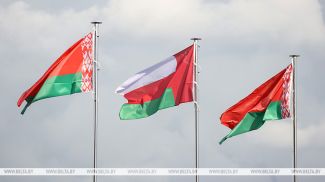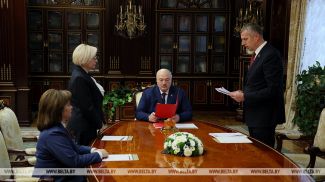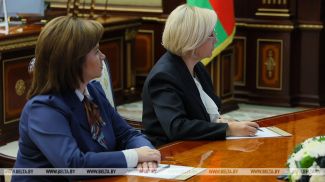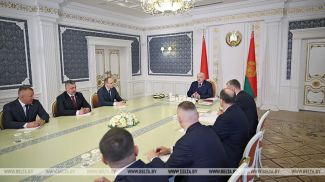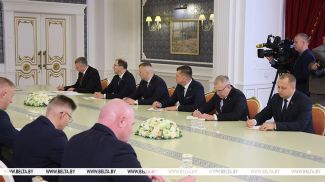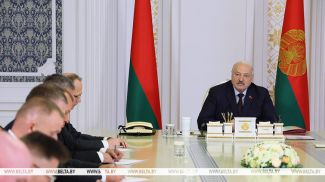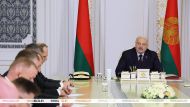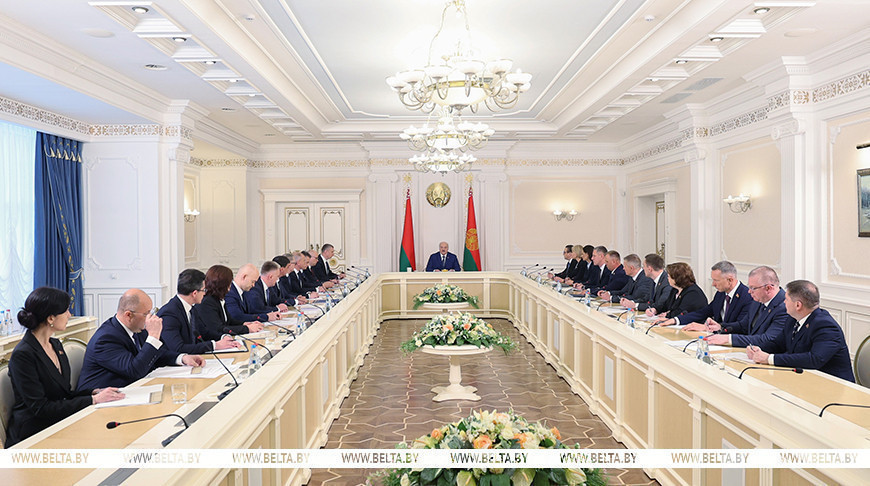
MINSK, 12 June (BelTA) – Belarusian President Aleksandr Lukashenko set a number of priority tasks for a so-called political headquarters of the country during a meeting with the leadership of the Belarus President Administration on 12 June, BelTA has learned.
According to Aleksandr Lukashenko, back in the time the decision was taken to hold such meetings on a regular basis. The president also regularly holds meetings with the economic bloc of the country to compare views, discuss existing problems and update tasks.
“We have established a good practice of working with the government to discuss topical issues that are brought to the presidential level. Naturally, these issues go not only through the government, but also through the final authority - the Belarus President Administration. We discuss and make decisions on these issues. I would like this practice to stay in place in our work as well,” Aleksandr Lukashenko said.
The head of state added that the election campaign had long been over in the country. Promises to the people have been made, and the strategy of the country’s political, economic and social development for the next five years has been defined. “We will touch upon the matter once again at the Belarusian People's Congress (we need to thoroughly prepare for the Belarusian People's Congress) and discuss not just our immediate plans, but plans for the medium term. At least for the next five years,” the president said.
“You are the president's political headquarters and supervisory body. You are a certain border between the president and other structures. You are vested with a number of functions that make you responsible for the results the whole country is striving for,” Aleksandr Lukashenko emphasized.
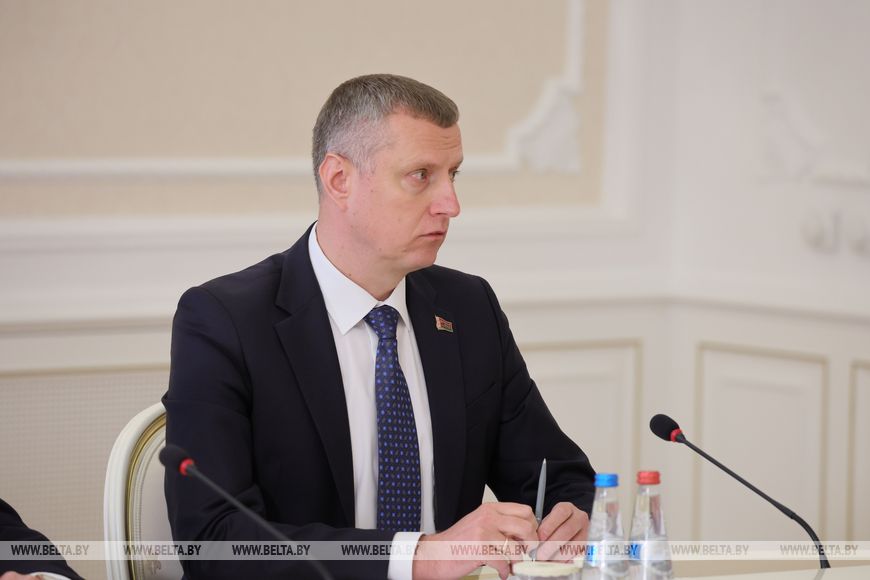
According to the head of state, almost all key appointments and decisions made at the highest level go through the Belarus President Administration.
“I am not exaggerating when saying that the work in the Belarus President Administration, the work of the head of the Administration, the management is akin to a ‘hot frying pan’. The purpose of today’s work is to identify bottlenecks, adjust approaches to solving the tasks that have been set for the country,” Aleksandr Lukashenko said.
Among the main topics raised at the meeting were personnel management, ideological activities, legislation improvement and control over the implementation of the head of state's orders, public appeals and the role of presidential aides.
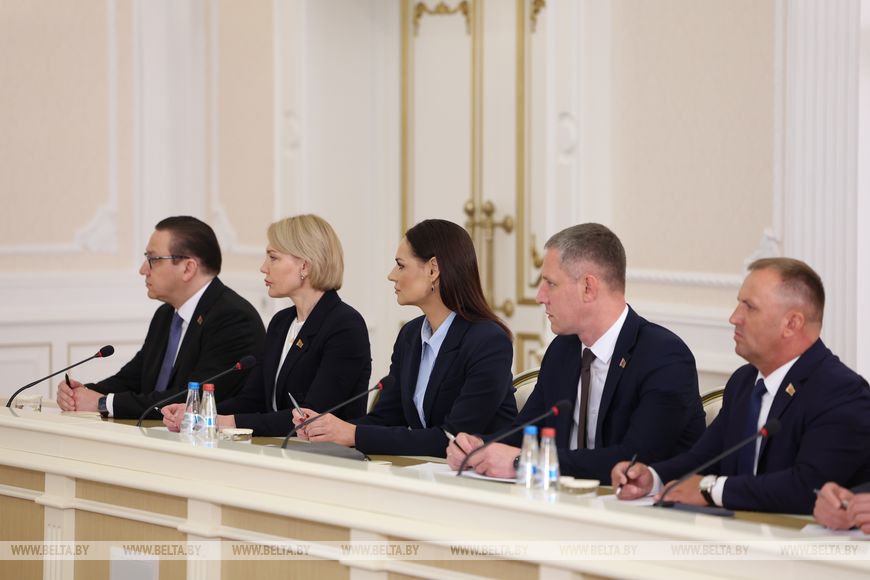

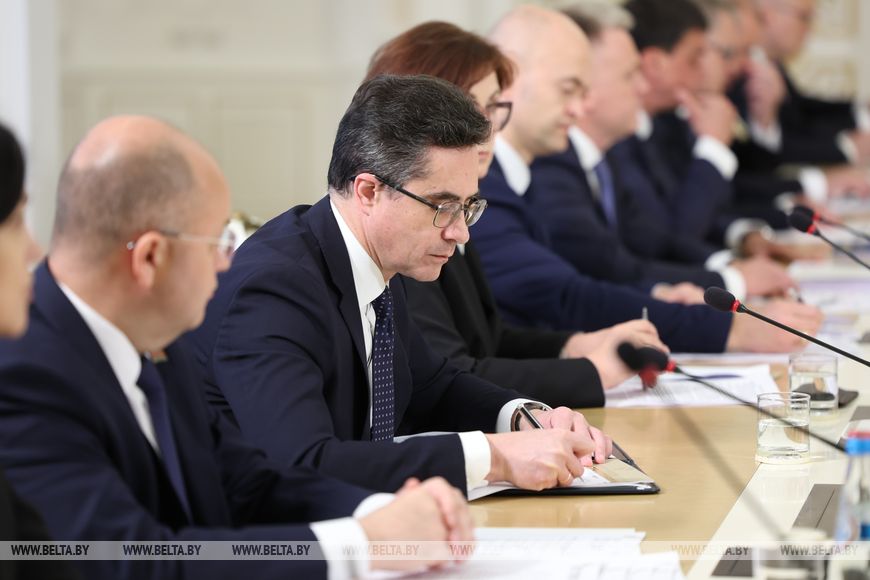
According to Aleksandr Lukashenko, back in the time the decision was taken to hold such meetings on a regular basis. The president also regularly holds meetings with the economic bloc of the country to compare views, discuss existing problems and update tasks.
“We have established a good practice of working with the government to discuss topical issues that are brought to the presidential level. Naturally, these issues go not only through the government, but also through the final authority - the Belarus President Administration. We discuss and make decisions on these issues. I would like this practice to stay in place in our work as well,” Aleksandr Lukashenko said.
The head of state added that the election campaign had long been over in the country. Promises to the people have been made, and the strategy of the country’s political, economic and social development for the next five years has been defined. “We will touch upon the matter once again at the Belarusian People's Congress (we need to thoroughly prepare for the Belarusian People's Congress) and discuss not just our immediate plans, but plans for the medium term. At least for the next five years,” the president said.
“You are the president's political headquarters and supervisory body. You are a certain border between the president and other structures. You are vested with a number of functions that make you responsible for the results the whole country is striving for,” Aleksandr Lukashenko emphasized.

According to the head of state, almost all key appointments and decisions made at the highest level go through the Belarus President Administration.
“I am not exaggerating when saying that the work in the Belarus President Administration, the work of the head of the Administration, the management is akin to a ‘hot frying pan’. The purpose of today’s work is to identify bottlenecks, adjust approaches to solving the tasks that have been set for the country,” Aleksandr Lukashenko said.
Among the main topics raised at the meeting were personnel management, ideological activities, legislation improvement and control over the implementation of the head of state's orders, public appeals and the role of presidential aides.

First. Personnel
Aleksandr Lukashenko described personnel management as the key area in the work of the Belarus President Administration. “Just like they used to say in Soviet times: the party relies on personnel,” he said.
“Every year we form and update the personnel reserves but once a job opening becomes available, we keep looking for a long time and we don’t find candidates for the open position right away. Even for the personnel registry of the head of state,” Aleksandr Lukashenko remarked.
In his words, some of the personnel management proposals submitted to the president lack polish.
“The Belarus President Administration has to approach the selection of suggested candidates in a principled and tough manner. You are not allowed to make mistakes with regard to personnel,” the Belarusian leader stressed. “With your tentacles you have to see the personnel pool as a whole starting with collective farms, agricultural enterprises and ending with the top level. But you have to discuss proposals together before submitting them to the president. I simply warn you that the responsibility for personnel selections will be increased. If a good executive is available, then results are available. If there is no executive, then there is no result.”
Aleksandr Lukashenko described personnel management as the key area in the work of the Belarus President Administration. “Just like they used to say in Soviet times: the party relies on personnel,” he said.
“Every year we form and update the personnel reserves but once a job opening becomes available, we keep looking for a long time and we don’t find candidates for the open position right away. Even for the personnel registry of the head of state,” Aleksandr Lukashenko remarked.
In his words, some of the personnel management proposals submitted to the president lack polish.
“The Belarus President Administration has to approach the selection of suggested candidates in a principled and tough manner. You are not allowed to make mistakes with regard to personnel,” the Belarusian leader stressed. “With your tentacles you have to see the personnel pool as a whole starting with collective farms, agricultural enterprises and ending with the top level. But you have to discuss proposals together before submitting them to the president. I simply warn you that the responsibility for personnel selections will be increased. If a good executive is available, then results are available. If there is no executive, then there is no result.”
Second. Ideology
"Once, everyone avoided this term, but I firmly introduced the concept of 'ideology'. As you can see, today everyone is talking about ideology, even Americans. There is no need to shy away from it: no one has come up with a better way to describe the process of various transformations, goals, and ideas, whether written down or embedded in people's minds. But they must be grounded in reality. Unlike in Soviet times, when everyone wanted to build communism, but no one truly knew what it was," Aleksandr Lukashenko stressed.
The president has repeatedly criticized the effectiveness of Belarus’ ideological system. "We have made various decisions, but there is still too much formalism [in the system]," he pointed out.
He demanded an end to formal approaches, emphasizing that meetings should not be held just for the sake of appearances. According to the president, the number of attendees in a meeting is less important than how many people actually take away something meaningful from the meeting.
"It is necessary to establish streamlined ideological work in the country. There is no need to hold more meetings, sessions, or forums. Before making any decision, consider its cost, whether it is expensive," Aleksandr Lukashenko emphasized.

In this regard, the president instructed officials to closely monitor official trip expenses, emphasizing that not all trips are financially justified, and require better regulation. "I approve a minister’s trip, for example, but then an entire entourage follows him. This must be strictly controlled: notify the prime minister, who submits proposals, and others. These are enormous costs," the Belarusian leader stated. "Even the president has a whole ‘cavalcade’. Let’s come back to reality and put things in order, regardless of positions or status."
In April, the head of state signed Directive No.12 “On implementing fundamental principles of the ideology of the Belarusian state”. The document aims to elevate ideological work to a brand new level, but Aleksandr Lukashenko believes that the President Administration has been bogged down by routine tasks.
"Do not approach issues formally: analyze them thoroughly," he instructed. "We need to strengthen our ideological system, review public outreach efforts, and free ideologists from unnecessary tasks."
"Television is a good medium, and we have started to embrace the internet. But I always say: we must communicate with people face-to-face. They respect and appreciate this," the president added.
Third. Legislation
According to Aleksandr Lukashenko, the redundant legislation array and parallel regulations still remain a problem.
“It is a huge layer of work. I know what lawmaking is. You need to organize and review what we have created in the last 10, 20 or possibly 30 years and cut off what we don’t need today. Leave only what we need,” the head of state said.
The Belarus President Administration started working on it a long time ago and certain results have already been secured.
“Don’t forget it,” the president stressed. “You have to pay attention to the quality of the work experts do on lawmaking initiatives. We need more precise predictions of the legal impact of the draft regulatory acts submitted by the government and polished by you in the medium term.”
Fourth. Oversight over fulfillment of written instructions
Aleksandr Lukashenko reminded of yet another most important function of the Belarus President Administration: oversight over the fulfillment of written and verbal instructions of the head of state.
“If you don’t control it, if you don’t make sure that the president’s instructions get fulfilled, then the president has nothing to do in the country. His authority will shrink and in the end we may come to a point when the nation thinks it does not need the president at all. But the president is necessary at present. Regardless of whether I or some other responsible person is in charge, the president is needed. But if he makes decisions, then these decisions must be implemented,” the head of state demanded.
A system of predictive control of the fulfillment of the head of state’s instructions has been established on the whole. But there are questions about the quality and timeliness of the fulfillment of these instructions from time to time, Aleksandr Lukashenko pointed out.
The president remarked that he personally keeps an eye on many issues. “And once I see the lack of control and development on the part of the [Belarus President] Administration, if I see that practices have not been assimilated, then you will have only yourselves to blame. And don’t accept any pro forma excuses,” the head of state warned. “It seems that you believe that a system of predictive control of the fulfillment of the head of state’s instructions has been established but we need results. Instead of excuses. There are problems with ensuring quality and timely fulfillment of the instructions from time to time.”
According to Aleksandr Lukashenko, the redundant legislation array and parallel regulations still remain a problem.
“It is a huge layer of work. I know what lawmaking is. You need to organize and review what we have created in the last 10, 20 or possibly 30 years and cut off what we don’t need today. Leave only what we need,” the head of state said.
The Belarus President Administration started working on it a long time ago and certain results have already been secured.
“Don’t forget it,” the president stressed. “You have to pay attention to the quality of the work experts do on lawmaking initiatives. We need more precise predictions of the legal impact of the draft regulatory acts submitted by the government and polished by you in the medium term.”
Fourth. Oversight over fulfillment of written instructions
Aleksandr Lukashenko reminded of yet another most important function of the Belarus President Administration: oversight over the fulfillment of written and verbal instructions of the head of state.
“If you don’t control it, if you don’t make sure that the president’s instructions get fulfilled, then the president has nothing to do in the country. His authority will shrink and in the end we may come to a point when the nation thinks it does not need the president at all. But the president is necessary at present. Regardless of whether I or some other responsible person is in charge, the president is needed. But if he makes decisions, then these decisions must be implemented,” the head of state demanded.
A system of predictive control of the fulfillment of the head of state’s instructions has been established on the whole. But there are questions about the quality and timeliness of the fulfillment of these instructions from time to time, Aleksandr Lukashenko pointed out.
The president remarked that he personally keeps an eye on many issues. “And once I see the lack of control and development on the part of the [Belarus President] Administration, if I see that practices have not been assimilated, then you will have only yourselves to blame. And don’t accept any pro forma excuses,” the head of state warned. “It seems that you believe that a system of predictive control of the fulfillment of the head of state’s instructions has been established but we need results. Instead of excuses. There are problems with ensuring quality and timely fulfillment of the instructions from time to time.”

Fifth. Public appeals
One of the topics touched upon by the president during the event was public appeals.
“In the ideal case, there should be none of them [such appeals]. At least, public appeals should not reach the level of the Belarus President Administration. They should be addressed locally,” the head of state said. “If they do reach, then in the course of addressing the matter special attention should be paid to analyzing the competence of the authorities that have failed to help people resolve the issue in the first place.”
The head of state noted that he often sees how top officials visit the place following a public appeal and declare that the matter turns out to be outside their remit and that these issues should have been solved locally. “Why do you go there then, if you make such a statement? If you go to solve the matter, then it is your matter, too. You have made such a decision. And then think to yourself: who did not solve this issue, who did not repair the fence or paint it, for example. There can be different issues. Who promised natural gas supply and didn't deliver it in time?” the head of state said.
Aleksandr Lukashenko emphasized that the government should see and know what people say about it at home and abroad, what remarks they make. The Belarus President Administration should inform the head of state on every important matter. “Collect the information, bring it to the level of the president so that I can study it and, taking it into account, make decisions,” the Belarusian leader added.
One of the topics touched upon by the president during the event was public appeals.
“In the ideal case, there should be none of them [such appeals]. At least, public appeals should not reach the level of the Belarus President Administration. They should be addressed locally,” the head of state said. “If they do reach, then in the course of addressing the matter special attention should be paid to analyzing the competence of the authorities that have failed to help people resolve the issue in the first place.”
The head of state noted that he often sees how top officials visit the place following a public appeal and declare that the matter turns out to be outside their remit and that these issues should have been solved locally. “Why do you go there then, if you make such a statement? If you go to solve the matter, then it is your matter, too. You have made such a decision. And then think to yourself: who did not solve this issue, who did not repair the fence or paint it, for example. There can be different issues. Who promised natural gas supply and didn't deliver it in time?” the head of state said.
Aleksandr Lukashenko emphasized that the government should see and know what people say about it at home and abroad, what remarks they make. The Belarus President Administration should inform the head of state on every important matter. “Collect the information, bring it to the level of the president so that I can study it and, taking it into account, make decisions,” the Belarusian leader added.
Sixth. The role of president's aides
During the meeting, Aleksandr Lukashenko outlined some key tasks, including revising aides' duties and enhancing their workload.
He recalled that the president's aides need to be fully involved in regional affairs. "Dmitry Nikolaevich [Krutoi, Head of the Belarus President Administration], your task is to ensure that the president's aides and regional inspectors work effectively," he stated.
The head of state stressed that aides’ functional responsibilities must be refined to increase their workload. According to the president, some officials merely wait for a promotion instead of actively working. "This must not happen," he said. "It is disgraceful."
The president pointed out that officials from central government bodies in Belarus are not actively seeking opportunities to demonstrate their abilities in the regions, where real, practical issues need to be addressed instead of theoretical discussions. "No one from the President Administration or the central government apparatus has really rushed to work on the local level," Aleksandr Lukashenko remarked.
He recalled that in Soviet times, this practice existed, and being appointed as head of an executive committee was considered an honor for a Communist Party member. "How many high-ranking officials demonstrated their initiative in the regions?" he asked rhetorically.

As an example, he cited China, which has partially adopted a similar approach from the Soviet era. "And their discipline - may God bless them," the Belarusian leader noted.
"You must be deeply involved in the life of the region, know every corner of it and demand, demand, demand [results]," Aleksandr Lukashenko emphasized, referring to the responsibilities of his aides. The president emphasized the importance of receiving comprehensive and accurate information about the situation in the regions. "I must not only know what, where, when, and why things are happening, but also see everything through your eyes: what is happening in the regions and how our people live there," he stated.
For example, if the country has declared a Year of Improvement, one of the key tasks for the president's aides is to ensure that every Belarusian citizen sees some changes. In this regard, Aleksandr Lukashenko reminded officials of existing regulations concerning the maintenance of areas surrounding residential buildings and demanded more active engagement with local communities to reinforce the importance of keeping their surroundings clean. If anyone is unable to maintain their property, such as elderly individuals living alone, local authorities should provide assistance.
"But if anyone is drinking or wandering around and cannot clean up their territories, then make them do it, by any means necessary, with the help of law enforcement or whoever, but ensure they maintain their areas and improve it," the president insisted.
Conclusions
Summarizing the above, Aleksandr Lukashenko said that the Belarus President Administration is a political headquarters, the final authority to make a decision. “You should by no means sympathize with anyone and take someone’s stance. You must be absolutely independent and objective. The task is to form an opinion independent from the rest of the institutions of power on all areas of state policy. You are forming my opinion,” the Belarusian leader said. “The more points of view are, the faster we will find the optimal solution to any issue. Therefore, ‘I control, you obey’ principle will never work for you.”
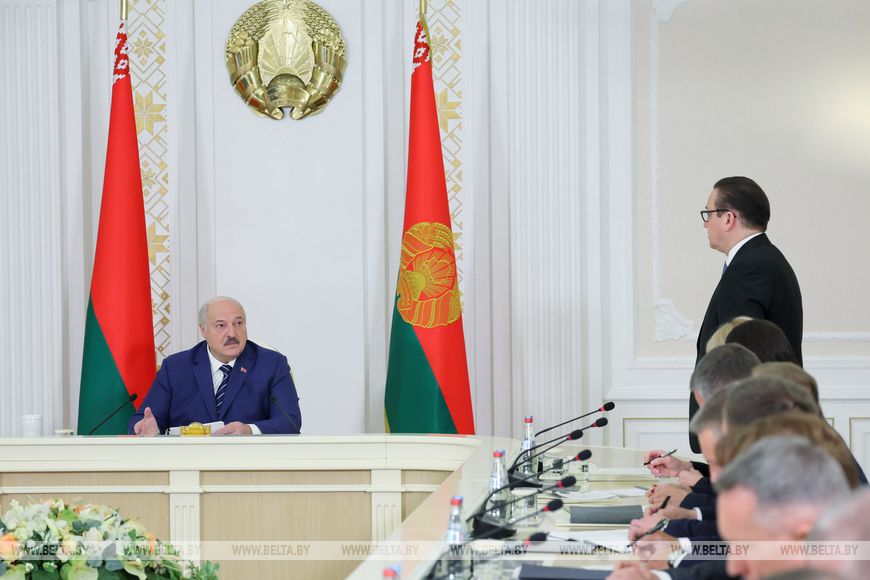
The head of state is convinced that all important issues should be discussed collectively and, perhaps, decisions should be made in the same way. The president should have an analytical report on his desk with a clear definition of major actions.
Aleksandr Lukashenko mentioned Directive No.11 “On improving the functioning of the system of government bodies and administration, strengthening executive discipline”. “Improving the quality of governance in general, ensuring executive discipline are among the main goals of our work,” Aleksandr Lukashenko said. “If there is no discipline, there will be no result.”
Summarizing the above, Aleksandr Lukashenko said that the Belarus President Administration is a political headquarters, the final authority to make a decision. “You should by no means sympathize with anyone and take someone’s stance. You must be absolutely independent and objective. The task is to form an opinion independent from the rest of the institutions of power on all areas of state policy. You are forming my opinion,” the Belarusian leader said. “The more points of view are, the faster we will find the optimal solution to any issue. Therefore, ‘I control, you obey’ principle will never work for you.”

The head of state is convinced that all important issues should be discussed collectively and, perhaps, decisions should be made in the same way. The president should have an analytical report on his desk with a clear definition of major actions.
Aleksandr Lukashenko mentioned Directive No.11 “On improving the functioning of the system of government bodies and administration, strengthening executive discipline”. “Improving the quality of governance in general, ensuring executive discipline are among the main goals of our work,” Aleksandr Lukashenko said. “If there is no discipline, there will be no result.”




